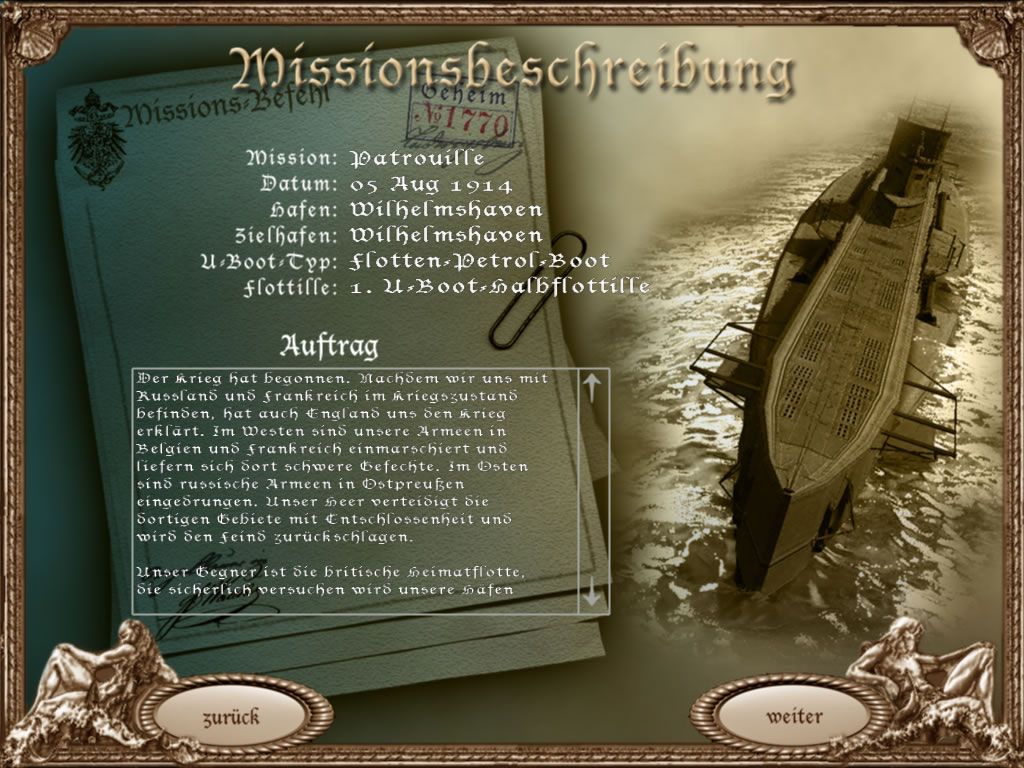Retro Replay Review
Gameplay
1914: Shells of Fury places you at the helm of a German U-boat in the early days of submarine warfare, offering a robust simulation of World War I naval combat. From the outset, you can customize the realism settings to suit your preferred challenge level, toggling features like unlimited fuel or oxygen for a more forgiving experience. This flexibility means veterans of subsims and newcomers alike can tailor the game to match their comfort with naval tactics and simulation depth.
(HEY YOU!! We hope you enjoy! We try not to run ads. So basically, this is a very expensive hobby running this site. Please consider joining us for updates, forums, and more. Network w/ us to make some cash or friends while retro gaming, and you can win some free retro games for posting. Okay, carry on 👍)
Mission structure revolves around patrolling designated sectors, intercepting enemy shipping routes, and delivering torpedoes with deadly precision. The core gameplay loop—plotting courses on the strategic map, engaging the time accelerator, and then switching to periscope or engine controls once a contact is detected—feels both intuitive and authentic. Without modern sonar, you rely on visual spotting, hydrophone listening, and tactical guessing to close in on targets, which adds a palpable tension to every engagement.
The game’s interface is streamlined for quick access: a menu bar at the bottom of the screen or hotkeys lets you hop between the map, engine room, torpedo tubes, periscope, and other critical stations. Managing these compartments under pressure, especially when toggling between depth settings and weapon loading, creates moments of intense, pulse-pounding drama. The included mission editor and generator also extend replayability, allowing you to craft custom scenarios or tackle randomized patrols.
Graphics
Graphically, 1914: Shells of Fury opts for a functional, clean style that prioritizes clarity over flashy effects. The submarine interior is rendered with crisp lines and readable dials, ensuring you can quickly interpret your depth, speed, and heading without straining your eyes. While the textures are modest by modern standards, they serve their purpose in enhancing immersion without overwhelming the simulation aspects.
On the external side, ship models and sea conditions adapt to different weather and time-of-day settings. Ships bob realistically in choppy waters, and wave reflections catch the light in a believable fashion, creating atmospheric patrols where the horizon can look both beautiful and foreboding. Occasional graphical pop-ins remind you that this is a simulation first and foremost, but they rarely detract from the moment-to-moment immersion.
Combat visuals center on the periscope view, which delivers a satisfying sense of focus as you track targets through crosshairs. Torpedo trails and explosions are depicted with crisp animations, giving each successful hit a palpable impact. The UI overlays—bearing lines, range indicators, and torpedo tube statuses—are designed for quick readability, which helps you stay on top of ever-changing tactical situations.
Story
The narrative in 1914: Shells of Fury is minimalist yet effective, delivered primarily through concise mission briefings that set the stage for each patrol. While there’s no sprawling cinematic plot, the historical context of early submarine warfare shines through as you’re tasked with disrupting Allied shipping lanes, laying mines at strategic chokepoints, and evading destroyer hunts. Each briefing includes intelligence updates and strategic goals, giving your missions a clear sense of purpose.
By focusing on authentic German naval directives rather than fictional characters, the game preserves a documentary feel. You become an officer in the Imperial Navy, reacting to real-world events like convoy tactics and the introduction of depth charges. This method of storytelling may feel sparse to players seeking character-driven drama, but it reinforces the hard-edged reality of wartime patrols, where orders and objectives mattered more than personal narratives.
Between campaigns—each covering different phases of the war—you sense the technological arms race at sea. Progressing from early U-boat classes to late-war vessels with additional torpedo tubes and deck weaponry highlights how tactics evolved under fire. The subtle shifts in mission design and equipment availability tell a broader tale about submarine development, reminding you that in 1914, every patrol was both mission and experiment.
Overall Experience
As a whole, 1914: Shells of Fury is a focused submarine simulation that excels at delivering authentic early World War I U-boat operations. Its depth customization caters to a broad audience, from those curious about naval history to seasoned subsim enthusiasts craving realistic controls. The mix of patrol, attack, and evasion tasks keeps gameplay varied, while the map-then-periscope loop underscores the strategic intensity of each sortie.
Although graphics and sound design remain functional rather than cutting-edge, they effectively serve the simulation’s core aims. The UI is clean and informative, and the periscope view offers enough visual fidelity to make every target feel like a genuine threat. If you prioritize immersive gameplay and historical accuracy over blockbuster presentation, this title will satisfy that niche fully.
Ultimately, 1914: Shells of Fury stands out as a contender for anyone interested in the origins of submarine warfare. Its emphasis on authentic mechanics, mission variety, and adjustable realism makes it a compelling choice for players who appreciate the unforgiving, high-stakes nature of U-boat command. Whether you’re laying mines under a moonlit sea or stalking convoys at dawn, the game delivers an engaging and educational dive into World War I’s naval theaters.
 Retro Replay Retro Replay gaming reviews, news, emulation, geek stuff and more!
Retro Replay Retro Replay gaming reviews, news, emulation, geek stuff and more!









Reviews
There are no reviews yet.